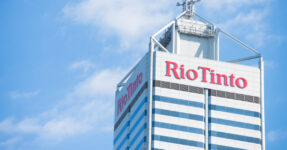Mining Giant Under Fire for Workplace Toxicity, Social Irresponsibility and Environmental Destruction

Mining giant Rio Tinto has vowed to implement the recommendations of a review into its toxic workplace culture, but in the eyes of many Australians, the company will have to do much much more if it is to garner confidence and respect.
The review
The review was one of its kind undertaken in the resources industry.
It was headed by former Sex Discrimination Commissioner Elizabeth Broderick (EB & Co), and was commissioned after a Western Australian Parliamentary Inquiry revealed that almost two dozen sexual assaults on the company’s mine sites had been reported to, and investigated by police over a two-year period.
Sexism, bullying, harassment
The review found sexism and bullying were entrenched across the company’s worksites, with a significant number of employees reporting that colleagues and managers commented on their appearance and expressed gendered assumptions about their competence. Women also reported being left out of decision-making and overlooked for career progression and promotion.
Some females reported that they feared telling management when they were pregnant and faced obstacles to flexible workplace arrangements.
The report found that these were indicative of the company’s white male dominated culture.
And, as is consistent with many other reports across various industries, women were significantly more likely to experience sexual harassment in the workplace, with only 7% of males reporting sexual harassment compared to 28% females.
The report also found that harmful behaviour was often tolerated or normalised, including from “serial perpetrators”.
21 reports of attempted or actual sexual assault
More alarmingly, the report also found beyond sexual harassment, there were incidences of rape of attempted rape, with twenty-one women reporting actual or attempted rape or sexual assault in the past five years.
Employees also reported significance levels of racism along with “normalisation” of such racism within the organisation. Survey data showed 11.7% of employees experienced racism in the past five years.
The company has vowed to implement, in full, all of the 26 recommendations made by Elizabeth Broderick.
Ms Broderick has made clear she believes the company has a genuine appetite for change and senior management have indicated a strong commitment to ensuring that the culture improves.
And while some are praising the mining giant’s openness and transparency regarding its issues and the steps it is taking towards resolution, Rio Tinto is no stranger to controversy or criticism over its nonchalance and even disregard towards social issues.
Rio Tinto’s controversial reputation
In Australia, the company has had a tense relationship with its employees for decades, which has, from time to time, resulted in industrial action over pay and working conditions.
In 1992, it launched legal action which effectively shut the unions out of its workforces. They were reinstated progressively in subsequent years.
Environmental issues
Its environmental track record is nothing to be proud of either.
Last year the company destroyed sacred 46,000 year old Aboriginal rock shelters at Juukan Gorge to expand an iron ore mine. Also last year it was discovered that the mining giant had underpaid traditional land owners, the Gumala Aboriginal Corporation (GAC), by as much as $400m over the life of an agreement made in 1997 in relation to the Yandicoogina mine near Newman in Western Australia.
So while the CEO Jakob Stausholm has said that the findings are “deeply disturbing” and that he feels shame and enormous regret to have learned the extent to which bullying, sexual harassment and racism are happening at Rio Tinto, what will really reinstate staff and public confidence in the company will be action – real change, not just a “commitment to change” across all areas with regard to it’s people, and also with regard to its social and environmental impact on the communities in which it operates.
Many Australians would agree that Rio Tinto has earned itself a reputation as a large company with a very uncaring attitude.
Time’s Up — it was a long time ago
Toxic workforces don’t just affect employees and their families. While those within often do suffer enormous duress, there is a much wider social impact too.
Time is up – for organisations which don’t foster healthy, safe working environments, and implement zero tolerance for discrimination, racism, harassment, bullying and other forms of misconduct.
But time is also up for organisations which don’t hold themselves to account for the highest standards of integrity and operate ethically, across all areas – consumers, the public, taxpayers, employees, and stakeholders all want, and deserve better.







